Titian’s interpretations of Ovid’s Metamorphoses prompted a new collection of poems inspired by these arresting mythological scenes. Here we publish a suite of poems by Jo Shapcott, George Szirtes, Simon Armitage, Carol Ann Duffy, Lavinia Greenlaw, Seamus Heaney and Don Paterson. You can also listen to Jo Shapcott and George Szirtes read their poems and discuss transformation and how the gods always have the upper hand.
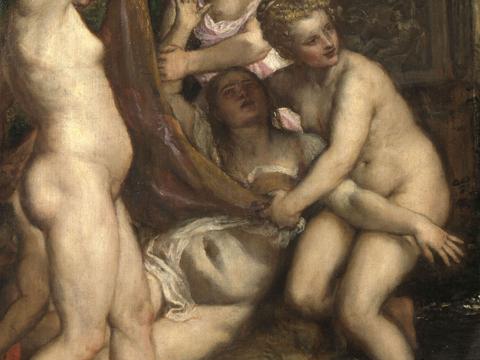
Callisto’s Song
* stars * stars * stars * stars * and * I *
* am * made * of * them * now * looking *
* down * on * myself * then * a * colorito * woman * yes*
* that * was * me * in * my * red * sandals * the * great *
* outdoors * curtained * golden * embroidered *
* and * heatshimmer * above * blue * mountains *
* nothing * vertical * not * even * the * plinth * and *
* no * speech * no * names * then * just * a * cry *
* as * the * busy * body * nymphs * stripped * me * because *
* we * all * had * rounded * bellies * then * but *
* nine * months * gone * so * my * navel * curved *
* like * a * gash * o * so * noticeable *
* among * all * the * diagonals * and * everyone *
* looking * a *different * way * looking * a * lot *
* especially * the * goddess * at * me * arrow-arm *
* pointing * bow-mouth * strung * and * dogs * crouched *
* because * they * sensed * consequences * and * gods *
* arriving * and * doing * what * gods * do * upstairs * and *
* the * artist’s * finger * loaded * and * the * paint * alive *
* alive * with * stars * stars * stars * stars * stars *
By Jo Shapcott
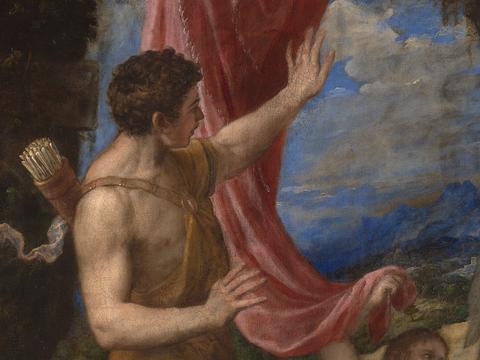
Actaeon
O, my America, my Newfoundland
(John Donne, Elegy 20)
O, my America, discovered by slim chance,
behind, as it seemed, a washing line
I shoved aside without thinking –
does desire have thoughts or define
its object, consuming all in a glance?
You, with your several flesh sinking
upon itself in attitudes of hurt,
while the dogs at my heels
growl at the strange red shirt
under a horned moon, you, drinking,
night water – tell me what the eye steals
or borrows. Why can’t we let go
without protest? My own body turns
against me as I sense it grow
contrary. Whatever night reveals
is dangerously toothed. And so the body burns
as if torn by sheer profusion of skin
and cry. It wears its ragged dress
like something it once found comfort in,
the kind of comfort even a dog learns
by scent. So flesh falls away, ever less
human, like desire itself, though pain
still registers in the terrible balance
the mind seems so reluctant to retain,
o, my America, my nakedness!
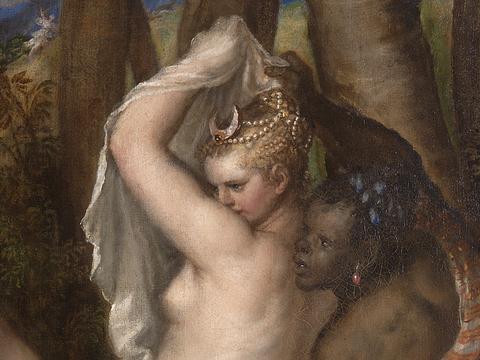
Diana and Actaeon
The whole hillside being smeared and daubed
with the blood of the hunt, I dropped down
to a stream whose water ran clear and cool,
and followed its thread through a wooded fold,
among branches dressed with pelts and skulls.
Then stumbled headlong into that sacred grove.
That’s when the universe pitched and groaned,
and I shrank from cloud-coloured flesh,
from calf and hip, curve and cleft,
from a writhing feast of fruit and meat:
salmon, silverside, redcurrant, peach;
from fingers worming for gowns and robes,
from eel and oyster, ankle and lip,
from bulb, bud, honeycomb, nest… And flinched
from Diana’s arm bent back like a bow,
and flinched from Diana’s naked glare –
a death-stare arrowed from eye to eye.
All seen in a blink but burnt on the mind.
The pink-red curtain of noon, drawn back,
unleashes the white wolves of the moon.
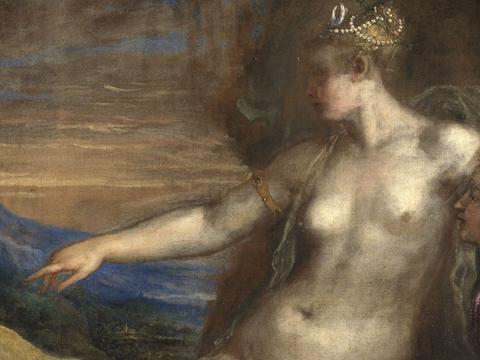
Detail from ‘Diana and Callisto’ (1556-9) by Titian. Copyright: The National Gallery, London.
Titian: Diana and Callisto
Girls, look where I point:
it’s not about her belly’s soft pout,
or a god whose name is a planet,
whether she was or wasn’t compliant
when she heard him pant
as his seed was spent
each bruise on her skin his fingerprint,
her unfit to bathe in so much as a pint
of our sacred stream, pregnant, penitent;
not about any of that, even should she repent
or prove her innocence conclusively, pin it
on him, on the stars, on myth, plant
the thought that she’s the victim here; my point,
ladies, is this – it’s all about paint.
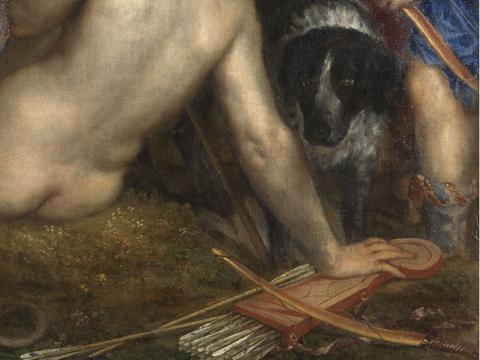
The Dark
What was I in their story? The dark.
An electric unknown, a girl
who slipped off the path and found
herself alone inside the forest’s locked room,
who set aside her quiver and bow
and lay down. When I woke
the world was in bright version.
I believed what I saw. He was not
what I saw. My body opened.
It was not my body. I became
a question that must not be asked
of the gods. I grew ripe with it.
I lost my place, my people.
I took the white ribbon from my hair.
Yet to her I was still what lit him.
She reached down and obscured my form.
My voice at first gaudy with argument
took on a rip, wrench and boom.
My body warped, bristled and cracked.
I was sinew and claw, my odour
that of a crowded cave in winter.
I was night torn from day.
I ran to escape my own shadow.
The beasts of the forest drove me out.
The villagers barred their doors.
The gods turned the page.
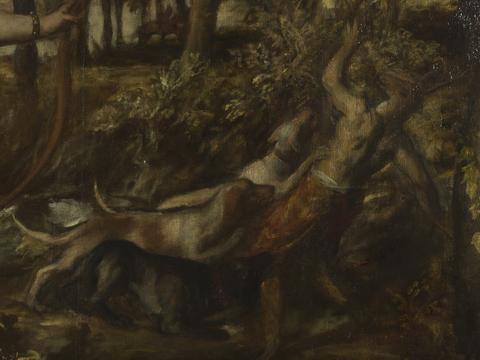
Detail from ‘The Death of Actaeon’ (1559-75) by Titian. Copyright: The National Gallery, London.
Actaeon
High burdened brown, the antlers that astound,
Arms that end now in two hardened feet,
His nifty haunches, pointed ears and fleet
Four-legged run… In the pool he saw a crowned
Stag’s head and heard something that groaned
When he tried to speak. Nor was it human sweat
That steamed off him: he was like a beast in heat,
As if he’d prowled and stalked until he found
The grove, the grotto and the bathing place
Of the goddess and her nymphs, as if he’d sought
That virgin nook deliberately, as if
His desire were hounds that had quickened pace
On Diana’s scent before his own pack wrought
Her vengeance on him, at bay beneath the leaf-
lit woodland. There his branchy antlers caught
When he faced the hounds
That couldn’t know him as they bayed and fought
And tore mouthfuls of hide and flesh and blood
Out of what he was, while his companions stood
Impatient for the kill, assessing wounds.
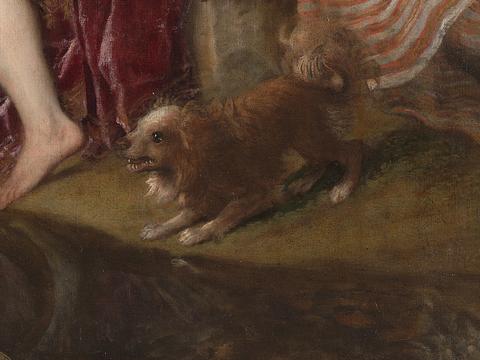
The Call
vellet abesse quidem, sed adest
Ovid, Metamorphoses, III
A winter train. A gale, a poacher’s moon.
The black glass. Do I honestly still blame
the wrong turn in the changing rooms I took
when I was six, and stood so long to look?
The scream Miss Venner loosed at me. “The nerve!”
I was ablaze. And it was worth the shame,
I thought; of course I did. It was too soon
to tell the dream from what I’d paid for it.
Then soon too late. Two sides of the same door.
So was it the recoil or the release
that lashed the world so out of shape? Tonight
I stare right through the face that I deserve
as all my ghost dogs gather at the shore,
behind them the whole sea like the police.
By Don Paterson
You can visit the National Gallery’s website for readings and more information about the ‘Titian: Metamorphosis’ celebrations.
Featured image: Titian, Diana and Callisto, 1556-1559







